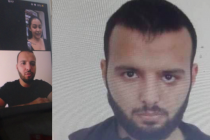The international isolation of Turkish Cypriots and their North Cyprus homeland will be raised in the British Parliament next month.
Scottish Baroness Nosheena Shaheen Mobarik has tabled a question to Rishi Sunak’s government asking about the “Ending the isolation of northern Cyprus, particularly by lifting sanctions on trade and travel.”
The peer’s oral question has been listed as official “upcoming business” in the Main Chamber of the House of Lords on Monday, 4 June 2024.
It is one of a number of oral questions being put to the UK Government that day, such as ‘the processes and decision making used NHS Continuing Healthcare’ and ‘Progress on negotiations towards a trade agreement between the UK and India’.
This is not the first time Baroness Mobarik, who is a member of the Conservative Party, has challenged the government over its North Cyprus policies and diplomacy.
Recently, she asked “His Majesty’s Government whether the British High Commissioner to Cyprus has visited the Muratağa, Sandallar and Atlilar memorial in Northern Cyprus; and, if not, what plans they have to visit?”
Lord Ahmad of Wimbledon, who is the Minister of State (Foreign, Commonwealth and Development Office), provided a written response to Baroness Mobarik on 8 May, but his answer did not address the question she raised.
Lord Ahmad said: “We recognise that the events of 1974 and the preceding period continue to cast a long shadow over Cyprus. We regularly engage with Cypriot civil society organisations to appropriately remember those who lost their lives, families and loved ones during the period. The UK continues to support the Committee for Missing Persons by providing financial support, including for DNA testing.”
The Muratağa, Sandallar and Atlilar memorial is dedicated to the 126 Turkish Cypriot victims – women, children and the elderly – who were slaughtered by Greek Cypriot militia in the summer of 1974 and their bodies put in mass graves.
Former Greek Cypriot Foreign Minister Erato Kozakou-Marcoullis acknowledged this crime against humanity in 2016, apologising for them on her Facebook page.
About the Cyprus Conflict
The Cyprus Conflict broke out in December 1963, when Greek Cypriots violently seized control of the Republic of Cyprus and tried to push through measures that would relegate its government partners, the Turkish Cypriots, to a minority status.
Despite Turkish Cypriots being subjected to brutal oppression for the next ten years, they continued to resist.
On 15 July 1974, a Greece-backed coup saw Archbishop Makarios toppled as President of the Republic of Cyprus and in his place was installed a notorious mass murderer, Nicos Sampson.
Sampson had been behind the murder of dozens of British military personnel during the Cyprus Emergency in the 1950s when the island was a British colony. Initially exiled, Sampson returned and, after Greek Cypriots seized power in December 1963, he then went on a killing spree of Turkish Cypriots, earning him the nickname ‘the Butcher of Omorphita’.
The mass murderer had sworn to wipe out Turkish Cypriots from the island, resulting in Turkiye intervening five days after the coup, on 20 July 1974. The island has been split into two ethnic zones ever since, a Turkish north and a Greek south. The division left thousands of people displaced from both communities, but it also resulted in the peace returning to the island – something the UN troops, which had been stationed on the island since 1964, had failed to achieve.
The Green Line
Like Turkiye, the UK is also a Guarantor of the Republic of Cyprus, whose remit is to protect the delicate balance and uphold the political partnership that was established between Turkish and Greek Cypriots when Cyprus became independent from Britain on 15 August 1960.
The 1960 independence treaties allowed the UK to retain to sovereign military bases in Cyprus, in Dhekelia and Akrotiri.
When Greek Cypriots attacked Turkish Cypriots and seized power in December 1963, British troops present on the island tried to keep the peace. It was Major-General Peter Young, the commander of the British Joint Force, who drew a line across the capital Nicosia a few days after the outbreak of the hostilities to try to keep the two sides apart, essentially creating the first buffer zone on the island.
The UK’s role in the embargoes
However, instead of pushing for the restoration of the power-sharing state between the two founders of the Republic of Cyprus, the UK inadvertently allowed the Greek Cypriots to get away with their 1963 coup.
A United Nations resolution, number 186, penned by the British, in March 1964, inadvertently referred to the Greek Cypriot coup government as the ‘Republic of Cyprus government’, while relegating Turkish Cypriots to a ‘minority community’.
The Greek Cypriots have used this unlawful status ever since to isolate Turkish Cypriots, placing a multitude of sanctions on them in the hope of pressurising them into accepting minority status. Sadly, the UK has gone along with this charade, which has influenced other states to do the same.
In April 2004, a UN-brokered plan, known as the Annan Plan, to unify the island was put to a vote. Two thirds of Turkish Cypriots voted in favour of the Annan Plan, while three in four Greek Cypriots voted against it.
After the results of the 2004 referendum, the UK was among many international actors pledging to end the international isolation of Turkish Cypriots, such as by facilitating direct trade and travel with North Cyprus. To date, they have failed to honour their promises.
It means that Turkish Cypriots must travel to their North Cyprus homeland either via Turkiye or South Cyprus, adding extra time and cost. Similarly, as the UK does not have official relations with Turkish Cypriots, direct trade is also not possible.
One of the primary reasons why successive UK governments have failed to support Turkish Cypriots since the outbreak of this conflict in 1963 is because of the need to protect its Eastern Mediterranean interest and specifically to preserve its two military bases thay are both located in the southern part of the island, which is under Greek Cypriot control. As a result, the British cannot afford to upset Greek Cypriots.
Who is Baroness Mobarik
Baroness Mobarik is a Glasgow-born politician of Pakistani heritage. She is a former a Member of the European Parliament for Scotland, from 2017 to 2020. She was made a Conservative Life Peer in 2014.
Before entering politics, Mobarik set up a successful and award-winning IT solutions business with her husband in the 1990s, which led to her being named Businesswoman of the Year in 2005.
She was a Member of the Business Advisory Forum of Glasgow Caledonian University (2007–2011), and also served on the West Regional Advisory Board of Scottish Enterprise (2009–2011).
Mobarik has also been an elected member of Council of CBI Scotland from 2001, winning four successive elections to 2011, when she became chair of CBI Scotland, serving for two years.
One of her chief focuses during her time as Chair was developing the agenda in support of growing small firms in Scotland and increasing Scotland’s exports.
The Baroness recently visited the Turkish Republic of North Cyprus to get a better understanding of the issues Turkish Cypriots face because of the embargoes they are forced to live under.





